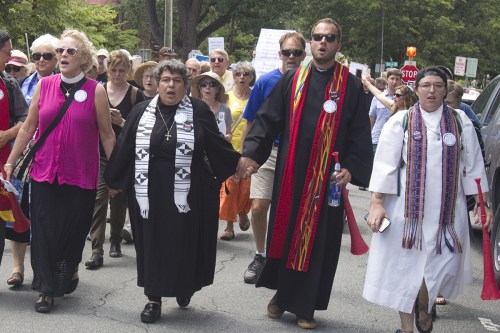
“Let us enter into that inner place of peace, that mood of meditation, that some call ‘prayer.’”
I say this most Sundays as part of my introduction to the time of our service called Going Deeper. This is when we take time for silence, light Candles of Hope and Remembrance and write in the Sands of Forgiveness and Atonement, share our deepest Joys and Sorrows, I try to find words to express, “all that we have heard and all that we have felt; all that we have found here and all that we have brought with us,” and our musician of the day offers a musical meditation to pull all of this together. I call this time “the heart of the service,” and it is intentionally positioned in the place most often reserved for the sermon. There is more time devoted to this portion of the service than to any other.
Yet I know that there are Unitarian Universalists who are uncomfortable with the word “prayer.” “Prayer” is one of the things that they left behind, along with an interventionist God who condemns “sinners” and “non-believers” to an eternity of hell fire and damnation. Call this time anything you want, they might say, except “prayer.”
I’d like to take a moment to remind us all that the word “prayer” is just that – a word. “Prayer” is simply a word used to describe something that all religions recognize as ultimately indescribable. It is, to borrow a phrase from the Zen Buddhist tradition, a finger pointing at the moon; it is not the moon itself.
So what is this word “prayer” pointing toward? It just so happens that I’ve written an entire book on the subject. [Simply Pray:a modern spiritual practice to deepen your life, published by Skinner House Books, available both in print and as an e-book! (Yes. Shameless plug.)] Simply put, though, I’d say that there’s a reason we call that “prayer” section of the service, “Going Deeper.”
 Most religious traditions – and psychologists, sociologists, cultural anthropologists, etc. – agree that most of us live most of our lives with a whole lot of cacophony, both external and internal. There is so much “noise,” so much stimulation, and we are encouraged to live (and do) at such a break-neck pace, that we lose our ability to simply be. It’s hard for us to really notice the moments of our lives, because really noticing the moments of our lives requires us to stop, or at least slow down. This thing “some people call ‘prayer'” is an intentional practice of slowing down and trying to let go of all that busy doing so that we might put ourselves into direct contact with the deep groundedness of being.
Most religious traditions – and psychologists, sociologists, cultural anthropologists, etc. – agree that most of us live most of our lives with a whole lot of cacophony, both external and internal. There is so much “noise,” so much stimulation, and we are encouraged to live (and do) at such a break-neck pace, that we lose our ability to simply be. It’s hard for us to really notice the moments of our lives, because really noticing the moments of our lives requires us to stop, or at least slow down. This thing “some people call ‘prayer'” is an intentional practice of slowing down and trying to let go of all that busy doing so that we might put ourselves into direct contact with the deep groundedness of being.
Another benefit of taking the time to slow down and quiet the noise that so easily distracts us, is an increased ability to make sense out of life – our lives and Life itself. This, too, is hard to do when we’re running around so much. Whether you call it “intuition,” “inner wisdom,” “deep knowing,” or even “the voice of God,” the underlying idea is the same – when we quiet our lives we can see and hear and know in ways that simply aren’t possible when we’re caught up in the cacophony of modern life.
All of this – the slowing down, the quieting, the noticing, the listening — is the “moon” toward which the “finger” of that word “prayer” points.
 But doesn’t prayer have to do with talking with God? Asking for things? Confessing our sins and begging for forgiveness? Well … maybe. But I truly don’t believe that those things are fundamental, essential to the understanding of prayer. After all, couldn’t you say that “talking with God” is a way of understanding “listening to our deepest wisdom”? And when we ask for things, doesn’t that require getting clarity about what’s really important to us? While there are certainly people who maintain that those other ways of understanding prayer are the only ways of understanding prayer, we, as Unitarian Universalists, are not required to accept the teachings of other religions exactly as they are understood in those traditions. Yet we are called to look for the wisdom these teachings contain. The notion that we could all use a little more silence and stillness, a little more clarity and wisdom, and little more attention to and awareness of the moments of our existence certainly seems like wisdom to me.
But doesn’t prayer have to do with talking with God? Asking for things? Confessing our sins and begging for forgiveness? Well … maybe. But I truly don’t believe that those things are fundamental, essential to the understanding of prayer. After all, couldn’t you say that “talking with God” is a way of understanding “listening to our deepest wisdom”? And when we ask for things, doesn’t that require getting clarity about what’s really important to us? While there are certainly people who maintain that those other ways of understanding prayer are the only ways of understanding prayer, we, as Unitarian Universalists, are not required to accept the teachings of other religions exactly as they are understood in those traditions. Yet we are called to look for the wisdom these teachings contain. The notion that we could all use a little more silence and stillness, a little more clarity and wisdom, and little more attention to and awareness of the moments of our existence certainly seems like wisdom to me.

I’m writing all of this because among the Charlottesville Clergy Collection’s recommendations for ways to respond to the upcoming “Unite the Right” rally, is a recommendation to engage in prayer. There is no doubt that some in that group – perhaps even many or most – understand this to mean petitioning an actively interventionist God to protect people, or open the hearts of the white nationalists, to give comfort to those who have been most directly harmed by the systems and structures of white supremacy (and those who actively and intentionally, and dare I say joyously give them life), or to open the floodgates of justice that they might roll down “like an ever flowing stream.”
Equally certainly there are Unitarian Universalists who dismiss all of that and, therefore, see no reason to engage in “[what] some people call ‘prayer.’” There are those who find the notion of “prayer” – as traditionally taught and understood, at least – to be as truly meaningless (literally void of any meaning) as they do the notion of “God” (as traditionally taught and understood). When we do this, though, we once again cut ourselves off from any kind of communion with other religious traditions; we once again throw up an impenetrable “wall of separation,” this time not between church and state but between our faith traditional and all others. And who among us, today, can say we favor the building of walls?
So while others prepare for the events of August 12th with their understanding(s) of prayer, I would encourage us UUs to do so with ours. For some, of course, those more traditional meanings ring true. For the rest, though, let me ask three questions:
 — Isn’t there a lot of “noise” surrounding the coming of the alt-right to Charlottesville? Isn’t there a lot of confusion about what to do, how to do it, who to do it with, and when and where it should be done? Prayer, as I’ve suggested we can think about it, offers a tool for turning down the volume on that cacophony so as to make it possible for us to listen to the wisdom we all have within ourselves (by whatever name we know it).
— Isn’t there a lot of “noise” surrounding the coming of the alt-right to Charlottesville? Isn’t there a lot of confusion about what to do, how to do it, who to do it with, and when and where it should be done? Prayer, as I’ve suggested we can think about it, offers a tool for turning down the volume on that cacophony so as to make it possible for us to listen to the wisdom we all have within ourselves (by whatever name we know it).
— And doesn’t all the media coverage, and social media commentary, and parking lot and grocery store conversations about how scary, and infuriating, and awful this is make it hard to keep track of the day-to-day beauty in our lives? Doesn’t this overwhelming demonstration of the worst we humans are capable of threaten our ability to see the best we are capable of? Prayer, as I’ve suggested understanding it, can help us to see the one without losing sight of the other, for this world is both brutal and beautiful, and to make a difference we must recognize both.
— And as you think about what’s happening in our city and, indeed, our country, do you feel your pulse race and your blood pressure rise? Can you feel yourself getting worn out, exhausted, by the stress of it all? Prayer, as I’ve tried to define it, can help us to “find a stillness, hold a stillness, [and] let the stillness carry [us],” as the hymn puts it. It can help us to carve out a place of rest, of calm, and “inner place of peace.” And from this place we can recharge our spiritual batteries so that we have the strength to do what must be done.
So … not only do the faith leaders who constitute the Charlottesville Clergy Collective recommend preparing for, and engaging with, the presence of hundreds of avowed white nationalist here in our own city with prayer, so do I. As Unitarian Universalists we are free to understand that in ways that make the most sense to us, yet we are also encouraged to see, honor, and learn from the wisdom of the traditions from which that word comes, and the moon toward which it points.
Pax tecum,
RevWik
